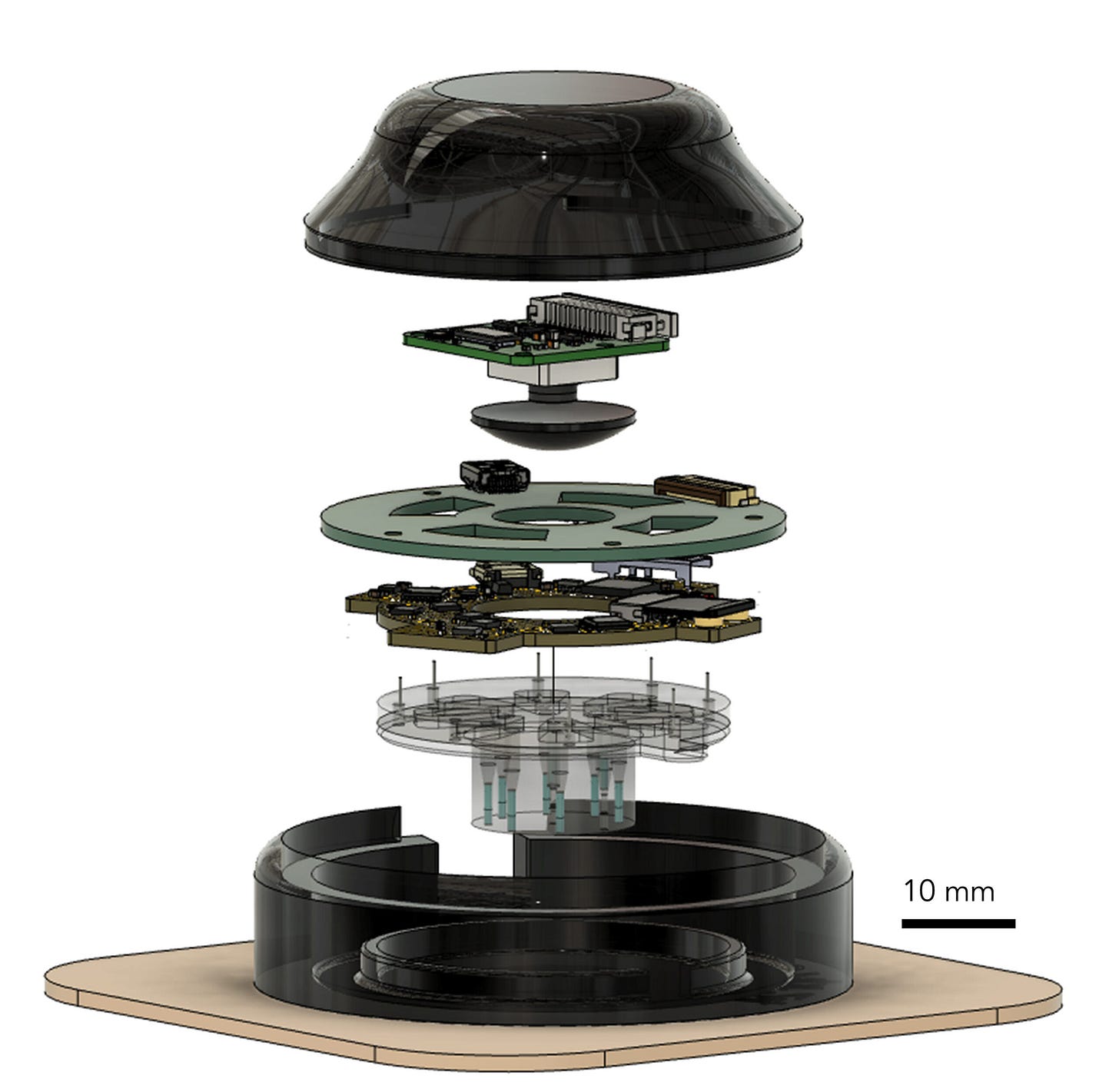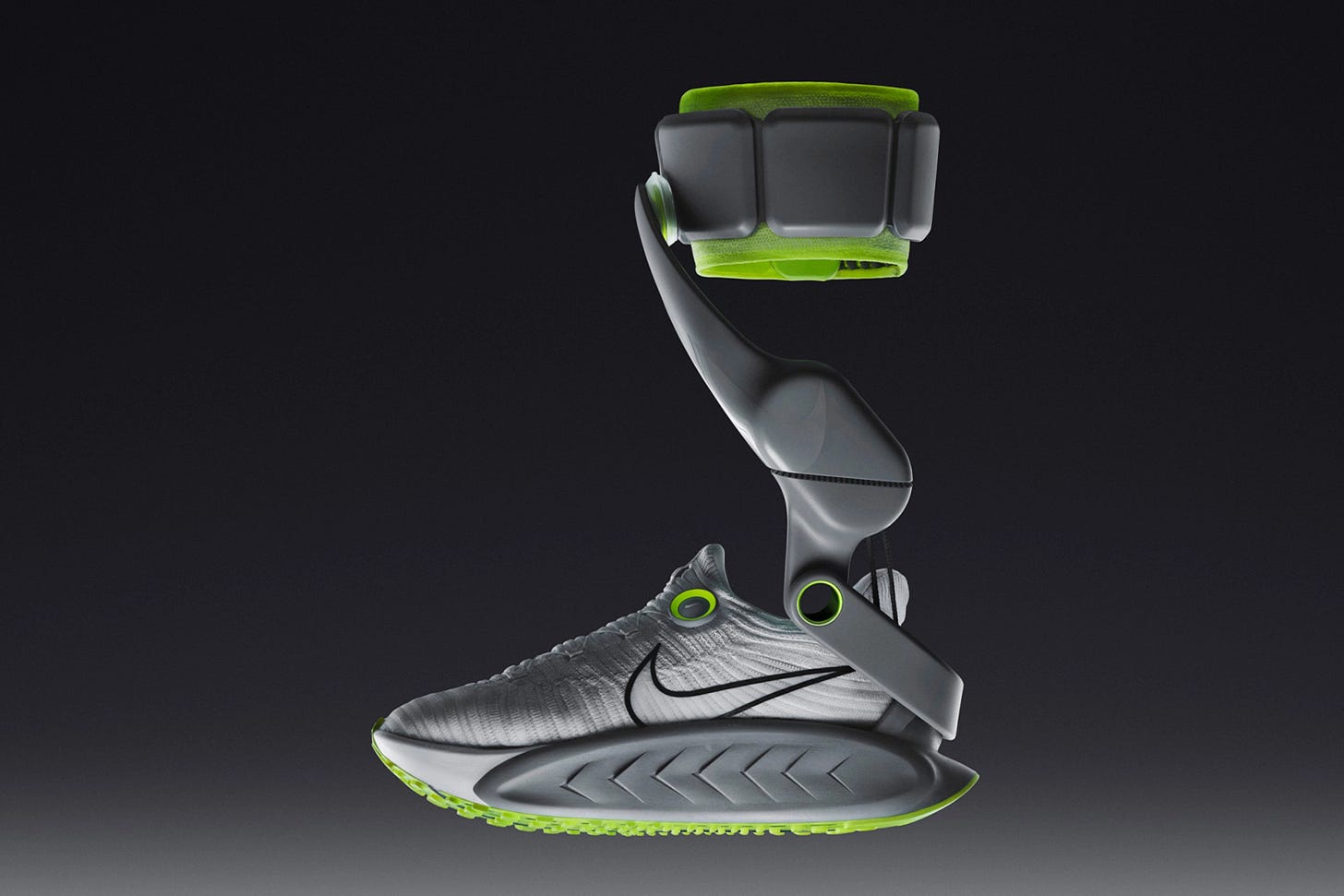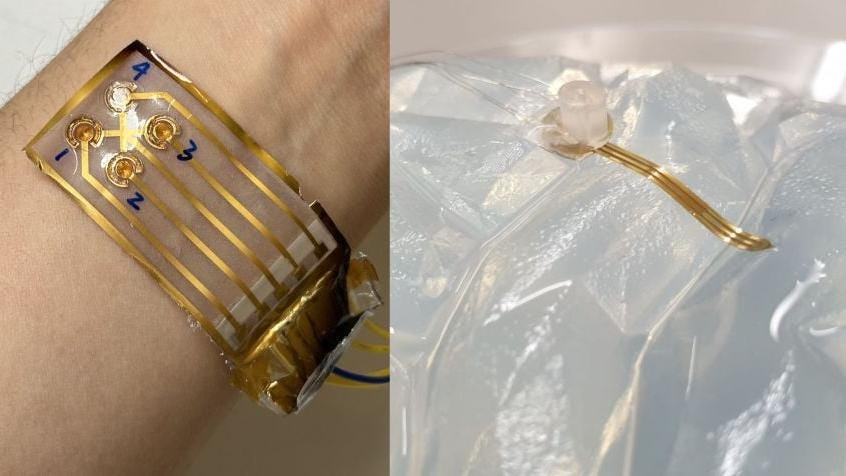Neurotech Notables #42: October 16-31 2025
Trick or Treatment? Push the Paradigm.
Happy Friday Readers 🎃
What a month it’s been!
In the last two weeks I’ve published fresh articles on BCI, BCI, BCI: I just partnered with TTP for an analysis about commercial costs, broke a story about Mark Cuban’s neurotech debut, recapped my NYBCI investor panel, and shared the full event summary and possible Oscar nominee video.
More soon. Now, your notables:
Seeing Clearly Now: Science’s BFD NEJM paper signals more than a linear scientific breakthrough - it spotlights the kind of technical and commercial chess needed to leapfrog human limits in the next decade.
In that vein, see new papers from Synchron and Cahira, a new key hire at Merge Labs, Nike’s neurotech-adjacent biomechanical wearable. A new review of Meta’s EMG band reveals cultural gaps. Sharena serves up “Neuronramps” of career advice. And don’t forget: Fresh Jobs 4 U
Money & Meaning: A cool 50 apiece in new financing deals for Alto and ONWARD, and a trove of deals for non-invasive neurotech across TMS, wearable BCI, fUS, mapping, along with signals of progress in tDCS, EEG, fNIRS, wearable PD tools. And *checks notes* neurotech tattoos.
Fish and Brain Chips: Neuralink announces their first UK implantee, A regulatory equivalency pathway opens up for FDA-cleared treatments to access UK markets starting in 2027, while a new report explores the limits of UK’s commercial neurotech ecosystem.
Taken for Granted: A bonanza of new, diverse grant funding for many clinical research projects, including the winners of the federal Neuromod prize, philanthropy dollars for bipolar disorder neurotech, new NIH grants, private donations for Alzheimer’s research and much more. New interdisciplinary, socially-attuned programs at Rice and Oxford spotlight exciting evolution of academic research.
Paradigm Shifts: A brilliant essay in STAT suggests the "neurology / psychiatry” division has become a barrier to humanity in healthcare. A former BARDA officer breaks down science’s marketplace problem. Brain Capital videos from top world leaders. New views and research across aging, gut/brain axis, neural recording, consciousness, and more.
Come say hi next week at the Neurotech Leaders Forum. Exciting new stuff coming in the coming weeks and months so stay tuned. And also, ahem:
🤝 Move Fast & Build Things: I’m seeking some bold new sponsors to partner up next year. Hit Reply!
👋🏽 Hi, I’m Naveen. I believe brain health is human health. You are one of the 3,247 readers of my biweekly reports on emerging neurotech markets.
click “❤️” | share for perks | upgrade | partner up | 💼 Job Board
📲 connect & collaborate here: email | LinkedIn | X | bluesky

NANS: NANS Urges Coverage for Peripheral Nerve Stimulation in Chronic Pain in Draft Policy - Learn more
TTP: What does it cost to build a brain-computer interface (BCI) today? Read more
Datwyler: Meet Our Team: SFN25 and IEEE EMBS: Connect with lead scientist Michel Wälti. We’ll also be at Biopac at booth #2033 & Medica at WT Wearable Technologies Hall # 12/C31
BrainMind: We’re convening founders, investors, scientists, and artists in NYC on Nov 5 for an intimate salon exploring how AI, neurotech, and psychedelics are redefining the science of the brain and mind. - Apply to attend here
Funding
ONWARD Medical Successfully Raises Over EUR 50 Million in Capital Increase (Globe Newswire)
Alto Neuroscience Announces $50 million Private Placement Financing (Alto Neuroscience)
SecondWave Systems Brings New Investor to Expanded Series A to Accelerate Development of Novel Ultrasound-Based Anti-Inflammatory Treatment (PR Newswire)
Mark Cuban Backs Synaptrix Labs Non-Invasive BCI Platform (Forbes)
Ampa Raises $8.5M to Take Portable Brain Stimulation Nationwide, Redefining Depression Treatment (Cision/Yahoo!)
MyelinZ Secures Innovate UK Funding to Advance BodyMirror AI+: Personalised Neuro-Coaching and Women’s Health Intelligence Integration (MyelinZ)
Neuromod Prize announces two Phase 3 winners at HLTH 2025 (Neuromod Prize)
“The winning teams’ devices can be adjusted for individualized treatment, have limited or no side effects, and are now ready to be considered for approval in clinical use.”
First-place winner University of Pittsburgh Department of Urology will receive $3 million. This team created a multichannel implantable device for sacral-pudendal neuromodulation that addresses bladder, bowel, and sexual disorders.
Second-place winner Juniper Biomedical (formerly RBI Medical) will receive $1.6 million. This team developed a highly precise, micro-implantable neuromodulation to treat stress urinary incontinence, overactive bladder, and fecal incontinence.
Myonerv wins two separate fully funded grants from Innovate UK, totaling £65,000 (LinkedIn)
Spark Biomedical Awarded an NIH Grant to Study the Treatment Effects of tAN for Alcohol Withdrawal Symptoms (Financial Content)
BD² awards $18 million in grants to advance research on the biology of bipolar disorder (AAAS/Milken Institute)
Incubators take note: A great model to fund novel clinical research.
Applications are open until Nov 21 for their 2026 grant awards.
UCSF gets ‘transformative’ $100M gift for research on memory, aging and Alzheimer’s (SF Chronicle)
Scientists at Scripps launch $14.2 million project to map the body’s “hidden sixth sense” (Science Daily)
Kaleida Capital Opens Allocation for NeuroAI Fund I, a $25M fund to invest in neural data infrastructure, BCI, and cognitive AI models.
Verified accredited investors can request materials by Nov 30.
Commercial
BrainsWay Makes Two Minority Investments In U.S. Mental Health Providers (BrainSway)
BrainsWay will invest $1.5 million initially, with the potential for up to an additional $2.5 million through three equal milestone-based tranches…Additionally, BrainsWay recently entered into a smaller minority investment agreement with a fast-growing East Coast-based mental health provider. With the completion of these two deals, BrainsWay said it has now made four strategic minority investments in 2025.
Sam Altman’s next startup eyes using sound waves to read your brain (The Verge)
“Sam Altman has tapped Mikhail Shapiro, an award-winning biomolecular engineer, to join the Merge Labs brain-computer interface startup he’s set to announce soon with co-founder Alex Blania. While Shapiro’s official title is unclear, sources say he will be part of Merge’s founding team and has been positioned as a key leader in talks with investors. Those talks are ongoing, but Merge expects to raise hundreds of millions of dollars from OpenAI and others, as The Financial Times earlier reported. Shapiro’s hiring signals a lot about the technical direction Altman is taking with Merge. His engineering lab at Caltech has pioneered several advances in biomolecular tech, with a special focus on noninvasive techniques for neural imaging and control.”
Precision Announces CTO Changes: Brian Otis and Nate Pletcher on Precision’s Next Chapter (Precision)
Rune Labs Appoints Digital Health Leader Adam Pellegrini to Board of Directors (Business Wire)
Boston Scientific continues to win in electrophysiology (Med Tech Dive)
Scienza Health and Samsung Expand AI Care Experience Across Galaxy Devices and TVs (Business Wire)
NeuroKaire Enters into R&D Collaboration with Compass Pathways to Pioneer Precision Treatments for Depression (PR Newswire)
BrainCheck Expands Normative Database to Further Support Accuracy and Consistency in Cognitive Assessment (BusinessWire)
Audicin launches neuroscience-based solution that transforms work time into recovery time, even in phone-free zones (Audacin)
Spinally announces start of clinical trial for spinal neuromodulation (LinkedIn)
Kandu, Inc. Announces Expansion of Executive Leadership Team and Board of Directors (PR Newswire)
First UK patient uses thought to control computer hours after Neuralink implant (University College London Hospitals)
Regulatory
Patients to benefit as UK and US regulators forge new collaboration on medical technologies and AI (Gov UK)
“The MHRA confirms that planned international reliance routes will allow medical devices approved by trusted regulators, including the FDA, to gain faster access to the UK market. This includes products cleared through the 510(k), De Novo, and PMA pathways…reforms in Great Britain are intended to enter legislation in 2026 and open new reliance routes from 2027.”
Related? Breaking down barriers to help the UK embrace neurotechnology (Center for British Progress)
Political Pressure at FDA: How the RFK Era is Reshaping Device Regulation (Steve Silverman)
US Taps Ex-Defense Official to Run Health Moonshot Agency (Bloomberg)
Neuromod’s Tinnitus Treatment Device Clears Multiple Regulatory Hurdles (Medical Product Outsourcing)

Industry
The New England Journal of Medicine Reports Science Corp.’s PRIMA BCI Implant Restores Functional Central Vision to Patients with Geographic Atrophy Caused By Age-Related Macular Degeneration (Science Corp | NEJM)
Cahira: Low-Frequency Sub-0.5 mm Magnetoelectric Antenna for Wireless Power Harvesting in Injectable Deep-Tissue Implants (IEEE)
Synchron: Decoding saccadic eye movements from brain signals using an endovascular neural interface (Journal of Neural Engineering)
Ability Neurotech looks to bring ‘mature’ implant to BCI market (Mass Device)
New Focused Ultrasound Neuromodulation Device for Brain Treatments Developed in UK (FUS Foundation)
“As a UCL spin-out company, NeuroHarmonics will develop a next-generation device with the same deep brain targeting precision but with improved accessibility (e.g., it will not be used within an MRI, and head shaving will not be necessary). The plan is to have a portable, wearable version of the system. Although NeuroHarmonics is not currently conducting any clinical trials, future studies are planned across a variety of indications, including essential tremor and depression.”
Flow Neuroscience completes 10-week pilot of at-home brain stimulation headset for depression in perimenopausal and menopausal women (LinkedIn)
Nike Unveils Project Amplify, the World’s First Powered Footwear System for Running and Walking (Nike)
A Whoop for your Brain (4am Club)
Emotiv: SpellerSSL: Self-Supervised Learning with P300 Aggregation for Speller BCIs (ArXiv | Commentary)
Improving Parkinson’s disease management through wearable technology: A cost benefit perspective (PLOS One)
My Journey + Resources for Yours in Neurotech: For trainees and early professionals wondering where the neuronramps are (Sharena Rice)
Global Optogenetic Equipment Market Valued at USD 400 Million in 2024, Projected to Reach USD 1.2 Billion by 2033, Growing at a 15.5% CAGR from 2026 to 2033 (PR Newswire)
MeSpace Names Neurable as Official Research Partner to Explore How Workspace Design Impacts Cognitive Performance (PR Newswire)
Neurable first consumer BCI to meet iMotions scientific standards (Ramses Alcaide)
Theranica’s Nerivio REN Wearable Validated in Landmark 55,000 Patient Study Published in Cephalalgia (PR Newswire)
Neurotech.TV
A global mission to restore vision | PRIMA by Science (Science Corp)
BrainMind grantee Dr. Richard Isaacson joins Bloomberg Longevity to share how precision medicine could upend the Alzheimer’s timeline (David Rubenstein)
Brain Lens Investing: New Paradigm for the Brain Economy Transition (NeuroCentury) + Living up to our Ambition in Building the Brain Economy (NeuroCentury)
Why Policy Could Make Or Break The Next Wave Of Health Innovation | Expanding Access Podcast (Behavioral Health Tech)
Groundbreaking prosthetics that can feel touch (Good Morning America)
What happens when we marry brains to machines? David Eagleman with Sergey Stavisky (Inner Cosmos)
From Halo to Flow: The Future of Brain Performance Tech w/ Erin Lee of Flow Neuroscience (Dr. Mike T. Nelson)
Towards a Brain Economy Research Agenda (NeuroCentury)
Society
Tear down the wall between neurology and psychiatry (Stat)
Meta visited me to test the Meta Ray-Ban Display glasses and Neural Band (aestumanda)
Insightful review by Colin Hughes, a man living with muscular dystrophy, that speaks to the distance between developing consumer and assistive technology: “Unfortunately, it quickly became clear that I couldn’t perform the available gestures Meta has programmed into the Display glasses for most people due to my muscle weakness. Even so, I genuinely felt that my feedback was heard, and I’m optimistic about the future of this EMG technology for people like me. Presumably, the EMG system — as it’s currently calibrated for general use — isn’t yet sensitive enough to detect the extremely faint muscle signals coming from my wrist and fingers. But if Meta can fine-tune this sensitivity for people with very limited movement, it could be life-changing.”
New study reveals why time seems to move faster the older we get (Live Science)
Neurotechnology, Law Enforcement, and Criminal Justice: Opportunities, Risks, and Human Rights Safeguards (Interpol)
Why Science Needs a Marketplace (Catalyze)
“This is one of two ways funders find scientists: open solicitations. The other is through relationships and networks. But those networks are finite, shaped by geography, institutions, and reputation. They work for the well-connected and exclude the rest.”
How ‘neurodivergent’ became a word for many types of minds (NPR)
See also this chart/article cluster from Notables #40
Your Headache is Serious. Science Should Take it Seriously. (NY Times)
Science must break its silence to rebuild public trust (LinkedIn)
Rice launches Brain Institute to accelerate discoveries in brain science and health (Rice)
Bingo (emphasis mine) “By uniting faculty in neuroengineering, neuroscience and psychological sciences, this interdisciplinary hub embodies the kind of bold, nimble collaboration that allows Rice to turn discovery into societal impact to save lives and enhance human flourishing.”
Research
Oxford University leads chronic pain treatment programme (Oxford Mail)
Like radar, a brain wave sweeps a cortical region to read out information held in working memory (The Picower Institute)
Brain state theory as a comprehensive model for addressing the “non-eloquent” brain in glioma surgery (Journal of Neuro-Oncology)
Detecting Awareness in the Intensive Care Unit Using Functional Near-Infrared Spectroscopy (Annals of Neurology)
Sensory expectations shape neural population dynamics in motor circuits (Nature | York U))
Mental exercise can reverse a brain change linked to aging, study finds ( NPR | JMIR)
Smart device uses AI and bioelectronics to speed up wound healing process (UCSC)

“Model of the a-Heal wearable device” (Source) Ultra-conformable tattoo electrodes for providing sensory feedback via transcutaneous electrical nerve stimulation (Scientific Reports)
An implantable CMOS deep-brain fluorescence imager with single-neuron resolution (Nature Electronics)
A clinical grade neurostimulation implant for hierarchical control of physiological activity (bioRxiv)
Data Drop: Prof. Yossi Mandel on Merging Electrodes and Neurons for High-Acuity Vision Restoration (Bionic Vision)
A Review of Mechanistic Efforts of Low-Intensity Focused Ultrasound (ScienceDirect)
Modelling sex differences of neurological devices in vitro (Nature Reviews Bioengineering)
New Study Demonstrates Accuracy of Two Quest AD-Detect Tests for Alzheimer’s Disease Diagnosis (PR Newswire)
Wearable Neurotechnology Systems for Upper Extremity Rehabilitation in Children with Cerebral Palsy: A Scoping Review (Frontiers)
The microbiota–gut–brain axis in mental and neurodegenerative disorders: opportunities for prevention and intervention (Frontiers in Aging Neuroscience)
Aging: the wound that never starts healing (Nature)
The brain portion of this is unfortunately narrow in scope, but I loved the title. And on that note: Happy Healoween 🧟
That’s a wrap! What did I miss? Send news + tips + suggestions for next time.





Boston Scientific's continued wins in electrophysiology reflect Farapulse's market dominance. The scale advantage they've built with over 200,000 patients treated creates real barriers for competitors trying to enter PFA. Combining that EP success with their structural heart portfolio (especially WATCHMAN) gives them diversified growth engines in high margin cardiac segments. The broader neurotech roundup here is excellent, but Boston Scientific's electrophysiology momentm deserves special attention since they're effectivly defining the PFA market standards as the incumbent. J&J and Medtronic are responding defensively rather than dictating terms.